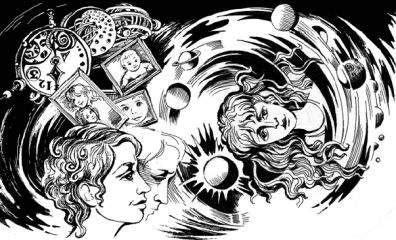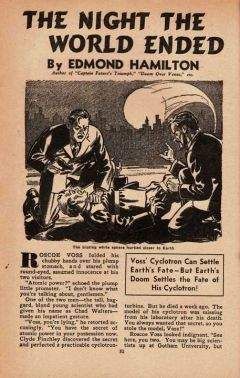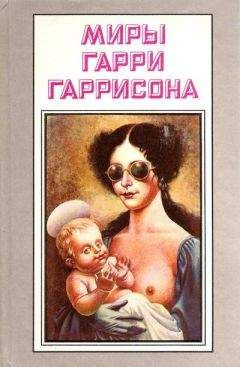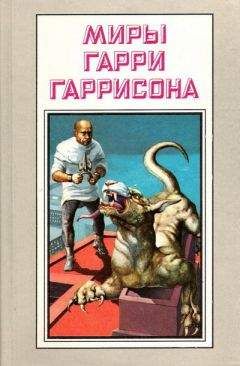Somerset Maugham - Sixty-Five Short Stories
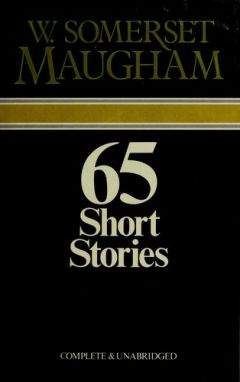
Скачивание начинается... Если скачивание не началось автоматически, пожалуйста нажмите на эту ссылку.
Жалоба
Напишите нам, и мы в срочном порядке примем меры.
Описание книги "Sixty-Five Short Stories"
Описание и краткое содержание "Sixty-Five Short Stories" читать бесплатно онлайн.
But then everything delighted her. She was amused by the river life and the life of the jungle, the teeming growth of the forest, the birds with their gay plumage and the brilliant butterflies. She set about giving the house a woman's touch; she put out all her own photographs and she got vases to put flowers in; she routed around and got a lot of knick-knacks to place here and there. 'They make a room look homey,' she said. She wasn't in love with Norman, but she liked him all right; and it was lovely to be married; it was lovely to have nothing to do from morning till night, except play the gramophone, or patience, and read novels. It was lovely to think one hadn't got to bother about one's future. Of course it was a bit lonely sometimes, but Norman said she'd get used to that, and he'd promised that in a year, or two at the outside, he'd take her to England for three months. It would be a lark to show him off to her friends. She felt that what had caught him was the glamour of the stage and she'd made herself out a good deal more successful than she really had been. She wanted him to realize that she'd made a sacrifice when she'd thrown up her career to become a planter's wife. She'd claimed acquaintance with a good many stars that in point of fact she'd never even spoken to. That would need a bit of handling when they went home, but she'd manage it; after all, poor Norman knew no more about the stage than a babe unborn, if she couldn't cod a simple fellow like that, after twelve years on the stage, well, she'd wasted her time, that's all she could say. Things went all right the first year. At one moment she thought she was going to have a baby. They were both disappointed when it turned out not to be true. Then she began to grow bored. It seemed to her that she'd done the same damned thing day after day for ever and it frightened her to think that she'd have to go on doing the same damned thing day after day for ever more. Norman said he couldn't leave the plantation that year. They had a bit of a scene. It was then that he'd said something that scared her.
'I hate England,' he said. 'If I had my way I'd never set foot in the damned country again.'
Living this lonely life Mrs Grange got into the habit of talking out loud to herself. Shut up in her room she could be heard chattering away hour after hour; and now, dipping the puff in her powder and plastering her face with it, she addressed her reflection in the mirror exactly as though she were talking to another person.
'That ought to have warned me. I should have insisted on going by myself, and who knows, I might have got a job when I got to London. With all the experience I had and everything. Then I'd have written to him and said I wasn't coming back.' Her thoughts turned to Skelton. 'Pity I didn't tell him,' she continued. 'I had half a mind to. P'raps he was right, p'raps it would have eased me mind. I wonder what he'd have said.' She imitated his Oxford accent. 'I'm so terribly sorry, Mrs Grange. I wish I could help you.' She gave a chuckle which was almost a sob. 'I'd have liked to tell him about Jack. Oh, Jack.'
It was when they had been married for two years that they got a neighbour. The price of rubber at that time was so high that new estates were being put under cultivation and one of the big companies had bought a great tract of land on the opposite bank of the river. It was a rich company and everything was done on a lavish scale. The manager they had put in had a launch at his disposal so that it was no trouble for him to pop over and have a drink whenever he felt inclined. Jack Carr his name was. He was quite a different sort of chap from Norman; for one thing he was a gentleman, he'd been to a public school and a university; he was about thirty-five, tall, not beefy like Norman, but slight, he had the sort of figure that looked lovely in evening dress; and he had crisply curling hair and a laughing look in his eyes. Just her type. She took to him at once. It was a treat, having someone you could talk about London to, and the theatre. He was gay and easy. He made the sort of jokes you could understand. In a week or two she felt more at home with him than she did with her husband after two years. There had always been something about Norman that she hadn't quite been able to get to the bottom of. He was crazy about her, of course, and he'd told her a lot about himself, but she had a funny feeling that there was something he kept from her, not because he wanted to, but-well, you couldn't hardly explain it, because it was so alien, you might say, that he couldn't put it into words. Later, when she knew Jack better, she mentioned it to him, and Jack said it was because he was country-born; even though he hadn't a drop of native blood in his veins, something of the country had gone to the making of him so that he wasn't white really; he had an Eastern streak in him. However hard he tried he could never be quite English.
She chattered away aloud, in that empty house, for the two boys, the cook and the house boy, were in their own quarters, and the sound of her voice, ringing along the wooden floors, piercing the wooden walls, was like the uncanny, unhuman gibber of new wine fermenting in a vat. She spoke just as though Skelton were there, but so incoherently that if he had been, he would have had difficulty in following the story she told. It did not take her long to discover that Jack Carr wanted her. She was excited. She'd never been promiscuous, but in all those years she'd been on the stage naturally there'd been episodes. You couldn't hardly have put up with being on tour month after month if you didn't have a bit of fun sometimes. Of course now she wasn't going to give in too easily, she didn't want to make herself cheap, but what with the life she led, she'd be a fool if she missed the chance; and as far as Norman was concerned, well, what the eye didn't see the heart didn't grieve over. They understood one another all right, Jack and her; they knew it was bound to happen sooner or later, it was only a matter of waiting for the opportunity; and the opportunity came. But then something happened that they hadn't bargained for: they fell madly in love with one another. If Mrs Grange really had been telling the story to Skelton it might have seemed as unlikely to him as it did to them. They were two very ordinary people, he a jolly, good-natured, commonplace planter, and she a small-part actress far from clever, not even very young, with nothing to recommend her but a neat figure and a prettyish face. What started as a casual affair turned without warning into a devastating passion, and neither of them was of a texture to sustain its exorbitant compulsion. They longed to be with one another; they were restless and miserable apart. She'd been finding Norman a bore for some time, but she'd put up with him because he was her husband; now he irritated her to frenzy because he stood between her and Jack. There was no question of their going off together, Jack Carr had nothing but his salary, and he couldn't throw up a job he'd been only too glad to get. It was difficult for them to meet. They had to run awful risks. Perhaps the chances they had to take, the obstacles they had to surmount, were fuel to their love; a year passed and it was as overwhelming as at the beginning; it was a year of agony and bliss, of fear and thrill. Then she discovered that she was pregnant. She had no doubt that Jack Carr was the father and she was wildly happy. It was true life was difficult, so difficult sometimes that she felt she just couldn't cope with it, but there'd be a baby, his baby, and that would make everything easy. She was going to Kuching for her confinement. It happened about then that Jack Carr had to go to Singapore on business and was to be away for several weeks; but he promised to get back before she left and he said he'd send word by a native the moment he arrived. When at last the message came she felt sick with the anguish of her joy. She had never wanted him so badly.
'I hear that Jack is back,' she told her husband at dinner. 'I shall go over tomorrow morning and get the things he promised to bring me.'
'I wouldn't do that. He's pretty sure to drop in towards sundown and he'll bring them himself.'
'I can't wait. I'm crazy to have them.'
'All right. Have it your own way.'
She couldn't help talking about him. For some time now they had seemed to have little to say to one another, Norman and she, but that night, in high spirits, she chattered away as she had done during the first months of their marriage. She always rose early, at six, and next morning she went down to the river and had a bathe. There was a little dent in the bank just there, with a tiny sandy beach, and it was delicious to splash about in the cool, transparent water. A kingfisher stood on the branch of a tree overhanging the pool and its reflection was brilliantly blue in the water. Lovely. She had a cup of tea and then stepped into a dug-out. A boy paddled her across the river. It took a good half-hour. As they got near she scanned the bank; Jack knew she would come at the earliest opportunity; he must be on the lookout. Ah, there he was. The delicious pain in her heart was almost unbearable. He came down to the landing-stage and helped her to get out of the boat. They walked hand in hand up the pathway and when they were out of sight of the boy who had paddled her over and of prying eyes from the house, they stopped. He put his arms round her and she yielded with ecstasy to his embrace. She clung to him.
His mouth sought hers. In that kiss was all the agony of their separation and all the bliss of their reunion. The miracle of love transfused them so that they were unconscious of time and place. They were not human any more, but two spirits united by a divine fire. No thought passed through their minds. No words issued from their lips. Suddenly there was a brutal shock, like a blow, and immediately, almost simultaneously, a deafening noise. Horrified, not understanding, she clung to Jack more tightly and his grip on her was spasmodic, so that she gasped; then she felt that he was bearing her over.
'Jack.'
She tried to hold him up. His weight was too great for her and as he fell to the ground she fell with him. Then she gave a great cry, for she felt a gush of heat, and his blood sputtered over her. She began to scream. A rough hand seized her and dragged her to her feet. It was Norman. She was distraught. She could not understand.
'Norman, what have you done?'
'I've killed him.'
She stared at him stupidly. She pushed him aside.
'Jack. Jack.'
'Shut up. I'll go and get help. It was an accident.'
He walked quickly up the pathway. She fell to her knees and took Jack's head in her arms.
'Darling,' she moaned. 'Oh, my darling.'
Norman came back with some coolies and they carried him up to the house. That night she had a miscarriage and was so ill that for days it looked as if she would die. When she recovered she had the nervous tic that she'd had ever since. She expected that Norman would send her away; but he didn't, he had to keep her to allay suspicion. There was some talk among the natives, and after a while the District Officer came up and asked a lot of questions; but the natives were frightened of Norman, and the D.O. could get nothing out of them. The Dyak boy who paddled her over had vanished. Norman said something had gone wrong with his gun and Jack was looking at it to see what was the matter and it went off. They bury people quickly in that country and by the time they might have dug him up there wouldn't have been much left to show that Norman's story wasn't true. The D.O. hadn't been satisfied.
'It all looks damned fishy to me,' he said, 'but in the absence of any evidence, I suppose I must accept your version.'
She would have given anything to get away, but with that nervous affliction she had no ghost of a chance any longer of earning a living. She had to stay-or starve; and Norman had to keep her-or hang. Nothing had happened since then and now nothing ever would happen. The endless years one after another dragged out their weary length.
Mrs Grange on a sudden stopped talking. Her sharp ears had caught the sound of a footstep on the path and she knew that Norman was back from his round. Her head twitching furiously, her hand agitated by that sinister, uncontrollable gesture, she looked in the untidy mess of her dressing-table for her precious lipstick. She smeared it on her lips, and then, she didn't know why, on a freakish impulse daubed it all over her nose till she looked like a red-nose comedian in a music-hall. She looked at herself in the glass and burst out laughing.
'To hell with life!' she shouted.
The Alien Corn
I had known the Blands a long time before I discovered that they had any connexion with Ferdy Rabenstein. Ferdy must have been nearly fifty when I first knew him and at the time of which I write he was well over seventy. He had altered little. His hair, coarse but abundant and curly, was white, but he had kept his figure and held himself as gallantly as ever. It was not hard to believe that in youth he had been as beautiful as people said. He had still his fine Semitic profile and the lustrous black eyes that had caused havoc in so many a Gentile breast. He was very tall, lean, with an oval face and a clear skin. He wore his clothes very well and in evening dress, even now, he was one of the handsomest men I had ever seen. He wore then large black pearls in his shirt-front and platinum and sapphire rings on his fingers. Perhaps he was rather flashy, but you felt it was so much in character that it would have ill become him to be anything else.
'After all, I am an Oriental,' he said. 'I can carry a certain barbaric magnificence.'
I have often thought that Ferdy Rabenstein would make an admirable subject for a biography. He was not a great man, but within the limits he set himself he made of his life a work of art. It was a masterpiece in little, like a Persian miniature, and derived its interest from its perfection. Unfortunately the materials are scanty. They would consist of letters that may very well have been destroyed and the recollections of people who are old now and will soon be dead. His memory is extraordinary, but he would never write his memoirs, for he looks upon his past as a source of purely private entertainment; and he is a man of the most perfect discretion. Nor do I know anyone who could do justice to the subject but Max Beerbohm. There is no one else in this hard world of today who can look upon the trivial with such tender sympathy and wring such a delicate pathos from futility. I wonder that Max, who must have known Ferdy much better than I, and long before, was never tempted to exercise his exquisite fancy on such a theme. He was born for Max to write about. And who should have illustrated the elegant book that I see in my mind's eye but Aubrey Beardsley? Thus would have been erected a monument of triple brass and the ephemera imprisoned to succeeding ages in the amber's translucency.
Ferdy's conquests were social and his venue was the great world. He was born in South Africa and did not come to England till he was twenty. For some time he was on the Stock Exchange, but on the death of his father he inherited a considerable fortune, and retiring from business devoted himself to the life of a man about town. At that period English society was still a closed body and it was not easy for a Jew to force its barriers, but to Ferdy they fell like the walls of Jericho. He was handsome, he was rich, he was a sportsman and he was good company. He had a house in Curzon Street, furnished with the most beautiful French furniture, and a French chef, and a brougham. It would be interesting to know the first steps in his wonderful career: they are lost in the dark abysm of time. When I first met him he had been long established as one of the smartest men in London: this was at a very grand house in Norfolk to which I had been asked as a promising young novelist by the hostess who took an interest in letters, but the company was very distinguished and I was over-awed. We were sixteen, and I felt shy and alone among these Cabinet Ministers, great ladies, and peers of the realm who talked of people and things of which I knew nothing. They were civil to me, but indifferent, and I was conscious that I was somewhat of a burden to my hostess. Ferdy saved me. He sat with me, walked with me, and talked with me. He discovered that I was a writer and we discussed the drama and the novel: he learnt that I had lived much on the Continent and he talked to me pleasantly of France, Germany, and Spain. He seemed really to seek my society. He gave me the flattering impression that he and I stood apart from the other members of the company and by our conversation upon affairs of the spirit made that of the rest of them, the political situation, the scandal of somebody's divorce, and the growing disinclination of pheasants to be killed, seem a little ridiculous. But if Ferdy had at the bottom of his heart a feeling of ever so faint a contempt for the hearty British gentry that surrounded us I am sure that it was only to me that he allowed an inkling of it to appear, and looking back I cannot but wonder whether it was not after all a suave and very delicate compliment that he paid me. I think of course that he liked to exercise his charm and I dare say the obvious pleasure his conversation gave me gratified him, but he could have had no motive for taking so much trouble over an obscure novelist other than his real interest in art and letters. I felt that he and I at bottom were equally alien in that company, I because I was a writer and he because he was a Jew, but I envied the ease with which he bore himself. He was completely at home. Everyone called him Ferdy. He seemed to be always in good spirits. He was never at a loss for a quip, a jest, or a repartee. They liked him in that house because he made them laugh, but never made them uncomfortable by talking over their heads. He brought a faint savour of Oriental romance into their lives, but so cleverly that they only felt more English. You could never be dull when he was by and with him present you were safe from the fear of the devastating silences that sometimes overwhelm a British company. A pause looked inevitable and Ferdy Rabenstein had broken into a topic that interested everyone. An invaluable asset to any party. He had an inexhaustible fund of Jewish stories. He was a very good mimic and he assumed the Yiddish accent and reproduced the Jewish gestures to perfection; his head sank into his body, his face grew cunning, his voice oily, and he was a rabbi or an old clothes merchant or a smart commercial traveller or a fat procuress in Frankfort. It was as good as a play. Because he was himself a Jew and insisted on it you laughed without reserve, but for my own part not without an under-current of discomfort. I was not quite sure of a sense of humour that made such cruel fun of his own race. I discovered afterwards that Jewish stories were his speciality and I seldom met him anywhere without hearing him tell sooner or later the last he had heard.
Подписывайтесь на наши страницы в социальных сетях.
Будьте в курсе последних книжных новинок, комментируйте, обсуждайте. Мы ждём Вас!
Похожие книги на "Sixty-Five Short Stories"
Книги похожие на "Sixty-Five Short Stories" читать онлайн или скачать бесплатно полные версии.
Мы рекомендуем Вам зарегистрироваться либо войти на сайт под своим именем.
Отзывы о "Somerset Maugham - Sixty-Five Short Stories"
Отзывы читателей о книге "Sixty-Five Short Stories", комментарии и мнения людей о произведении.






